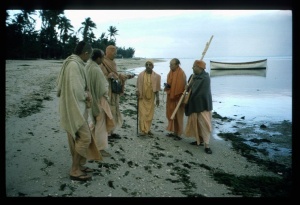SB 7.15.71: Difference between revisions
m (1 revision(s)) |
No edit summary |
||
| Line 1: | Line 1: | ||
{{info | {{info | ||
|speaker= | |speaker=Nārada Muni | ||
|listener=King | |listener=King Yudhiṣṭhira | ||
}} | }} | ||
[[Category:Srimad-Bhagavatam - Canto 07 Chapter 15]] | |||
[[Category:Bhagavatam Verses Spoken by Narada Muni - Vanisource|071571]] | |||
<div style="float:left">'''[[Srimad-Bhagavatam]] - [[SB 7|Seventh Canto]] - [[SB 7.15: Instructions for Civilized Human Beings|Chapter 15: Instructions for Civilized Human Beings]]'''</div> | |||
<div style="float:right">[[File:Go-previous.png|link=SB 7.15.70]] '''[[SB 7.15.70]] - [[SB 7.15.72]]''' [[File:Go-next.png|link=SB 7.15.72]]</div> | |||
{{RandomImage}} | |||
==== TEXT 71 ==== | ==== TEXT 71 ==== | ||
<div | <div class="verse"> | ||
ekadā deva-satre tu | :ekadā deva-satre tu | ||
gandharvāpsarasāṁ gaṇāḥ | :gandharvāpsarasāṁ gaṇāḥ | ||
upahūtā viśva-sṛgbhir | :upahūtā viśva-sṛgbhir | ||
hari-gāthopagāyane | :hari-gāthopagāyane | ||
</div> | </div> | ||
| Line 17: | Line 22: | ||
==== SYNONYMS ==== | ==== SYNONYMS ==== | ||
<div | <div class="synonyms"> | ||
''ekadā''—once upon a time; ''deva-satre''—in an assembly of the demigods; ''tu''—indeed; ''gandharva''—of the inhabitants of Gandharvaloka; ''apsarasām''—and the inhabitants of Apsaroloka; ''gaṇāḥ''—all; ''upahūtāḥ''—were invited; ''viśva-sṛgbhiḥ''—by the great demigods known as the ''prajāpatis''; ''hari-gātha-upagāyane''—on an occasion of ''kīrtana'' for glorifying the Supreme Lord. | |||
</div> | </div> | ||
| Line 24: | Line 29: | ||
==== TRANSLATION ==== | ==== TRANSLATION ==== | ||
<div | <div class="translation"> | ||
Once there was a saṅkīrtana festival to glorify the Supreme Lord in an assembly of the demigods, and the Gandharvas and Apsarās were invited by the prajāpatis to take part in it. | Once there was a saṅkīrtana festival to glorify the Supreme Lord in an assembly of the demigods, and the Gandharvas and Apsarās were invited by the prajāpatis to take part in it. | ||
</div> | </div> | ||
| Line 31: | Line 36: | ||
==== PURPORT ==== | ==== PURPORT ==== | ||
<div | <div class="purport"> | ||
Saṅkīrtana means chanting of the holy name of the Lord. The Hare Kṛṣṇa movement is not a new movement as people sometimes mistakenly think. The Hare Kṛṣṇa movement is present in every millennium of Lord Brahmā's life, and the holy name is chanted in all the higher planetary systems, including Brahmaloka and Candraloka, not to speak of Gandharvaloka and Apsaroloka. The saṅkīrtana movement that was started in this world five hundred years ago by Śrī Caitanya Mahāprabhu is therefore not a new movement. Sometimes, because of our bad luck, this movement is stopped, but Śrī Caitanya Mahāprabhu and His servants again start the movement for the benefit of the entire world or, indeed, the entire universe. | ''Saṅkīrtana'' means chanting of the holy name of the Lord. The Hare Kṛṣṇa movement is not a new movement as people sometimes mistakenly think. The Hare Kṛṣṇa movement is present in every millennium of Lord Brahmā's life, and the holy name is chanted in all the higher planetary systems, including Brahmaloka and Candraloka, not to speak of Gandharvaloka and Apsaroloka. The ''saṅkīrtana'' movement that was started in this world five hundred years ago by Śrī Caitanya Mahāprabhu is therefore not a new movement. Sometimes, because of our bad luck, this movement is stopped, but Śrī Caitanya Mahāprabhu and His servants again start the movement for the benefit of the entire world or, indeed, the entire universe. | ||
</div> | </div> | ||
__NOTOC__ | |||
<div style="float:right; clear:both;">[[File:Go-previous.png|link=SB 7.15.70]] '''[[SB 7.15.70]] - [[SB 7.15.72]]''' [[File:Go-next.png|link=SB 7.15.72]]</div> | |||
__NOTOC__ | |||
__NOEDITSECTION__ | |||
Revision as of 03:54, 3 July 2021

A.C. Bhaktivedanta Swami Prabhupada
TEXT 71
- ekadā deva-satre tu
- gandharvāpsarasāṁ gaṇāḥ
- upahūtā viśva-sṛgbhir
- hari-gāthopagāyane
SYNONYMS
ekadā—once upon a time; deva-satre—in an assembly of the demigods; tu—indeed; gandharva—of the inhabitants of Gandharvaloka; apsarasām—and the inhabitants of Apsaroloka; gaṇāḥ—all; upahūtāḥ—were invited; viśva-sṛgbhiḥ—by the great demigods known as the prajāpatis; hari-gātha-upagāyane—on an occasion of kīrtana for glorifying the Supreme Lord.
TRANSLATION
Once there was a saṅkīrtana festival to glorify the Supreme Lord in an assembly of the demigods, and the Gandharvas and Apsarās were invited by the prajāpatis to take part in it.
PURPORT
Saṅkīrtana means chanting of the holy name of the Lord. The Hare Kṛṣṇa movement is not a new movement as people sometimes mistakenly think. The Hare Kṛṣṇa movement is present in every millennium of Lord Brahmā's life, and the holy name is chanted in all the higher planetary systems, including Brahmaloka and Candraloka, not to speak of Gandharvaloka and Apsaroloka. The saṅkīrtana movement that was started in this world five hundred years ago by Śrī Caitanya Mahāprabhu is therefore not a new movement. Sometimes, because of our bad luck, this movement is stopped, but Śrī Caitanya Mahāprabhu and His servants again start the movement for the benefit of the entire world or, indeed, the entire universe.